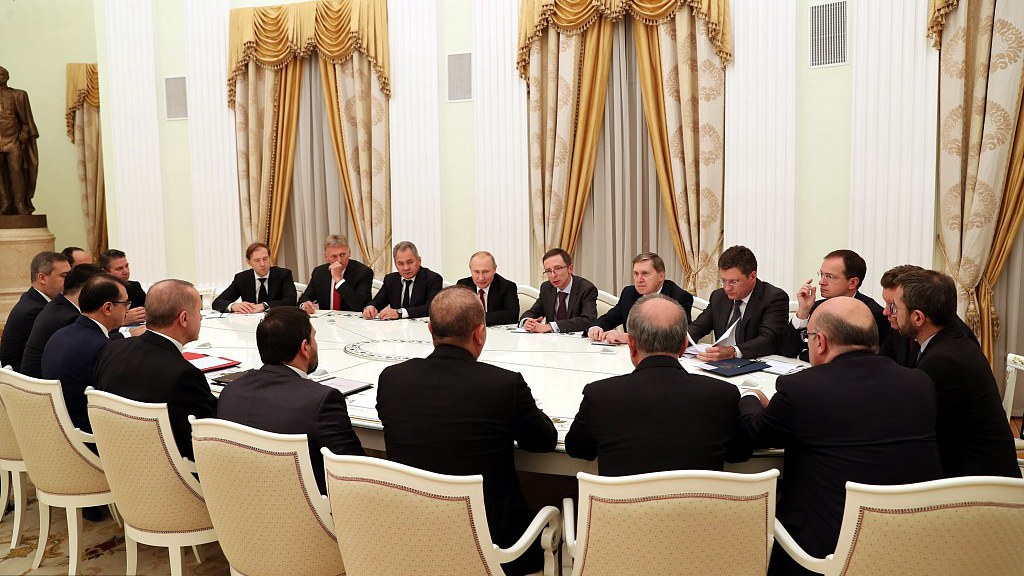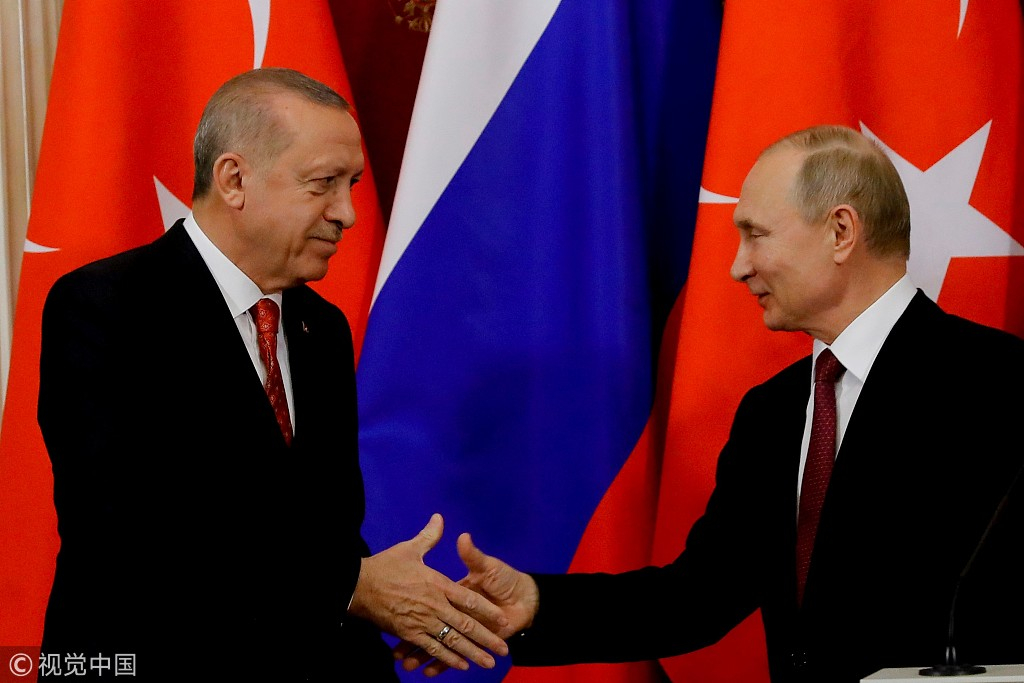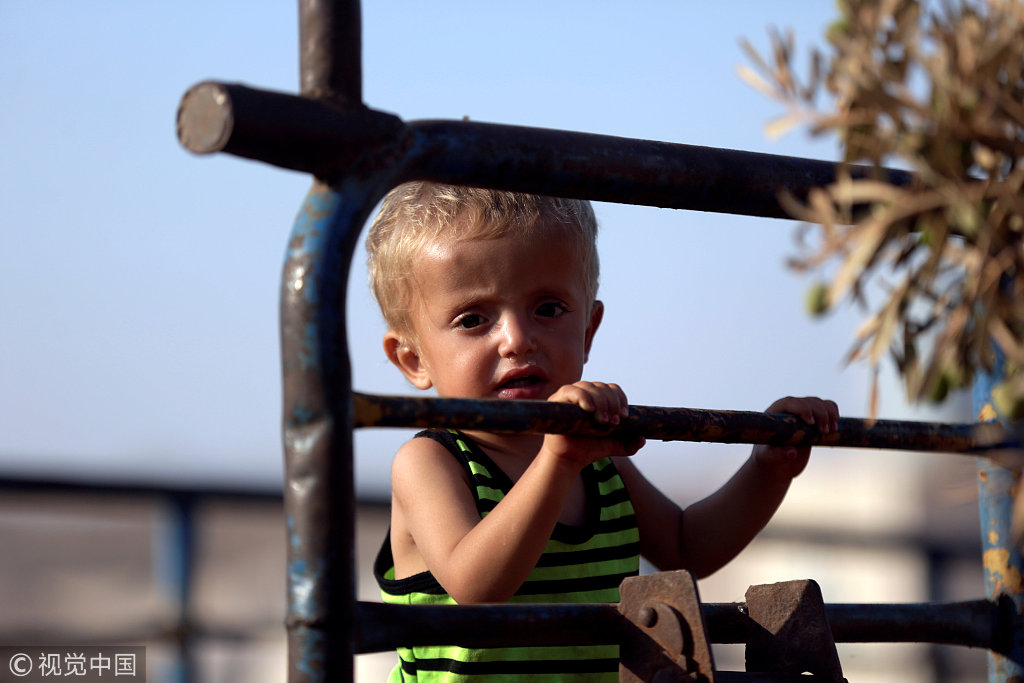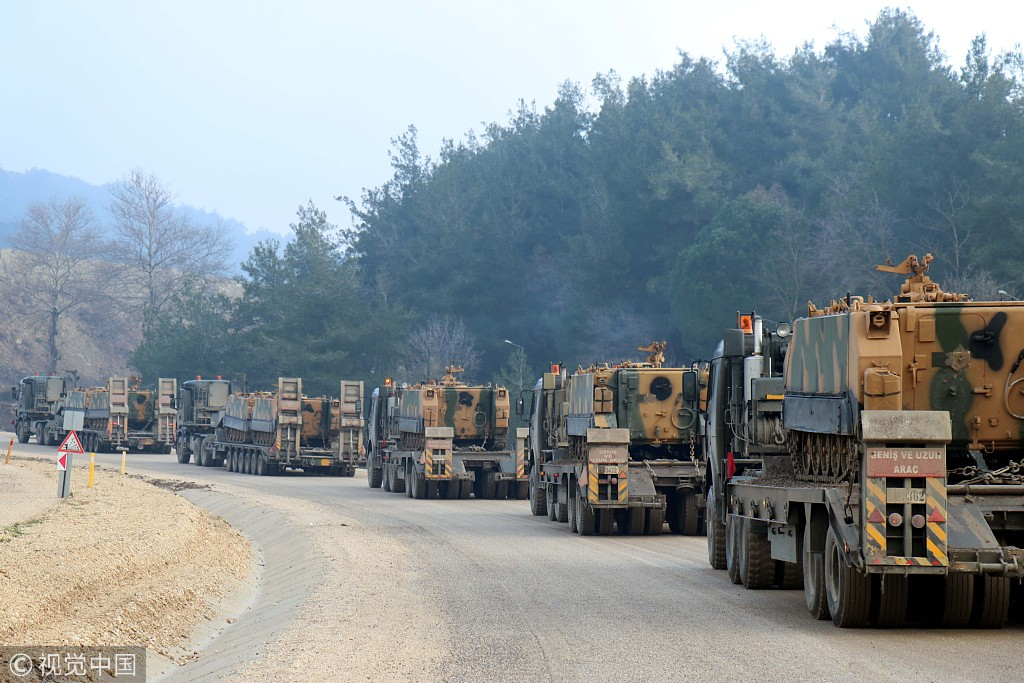
Opinion
12:18, 25-Jan-2019
Opinion: Turkey isolated on Syria
Updated
13:27, 25-Jan-2019
Wang Jin

Editor's note: Wang Jin is a research fellow at the Charhar Institute. The article reflects the author's opinion, and not necessarily the views of CGTN.
The just-concluded meeting between Russian President Vladimir Putin and his Turkish counterpart Recep Tayyip Erdogan in Moscow ended without any major consensus on the Syria issue.
While Putin stressed the importance of maintaining the status quo in northern Syria, Erdogan reiterated his commitment to launching a military offensive in the region.
Ahead of the Putin-Erdogan meeting, Russian Foreign Ministry expressed its concerns over the expansion of Hay'et Tahrir al-Sham (HTS), considered as a branch of Al-Qaeda in Syria.
The HTS, according to the Kremlin, has been expanding its clout in northern Syria, especially in the Idlib province, in the past few months.

Turkish President Recep Tayyip Erdogan (L) and Russian President Vladimir Putin (R) shake hands at the Kremlin Palace in Moscow, Russia, January 23, 2019. /VCG Photo
Turkish President Recep Tayyip Erdogan (L) and Russian President Vladimir Putin (R) shake hands at the Kremlin Palace in Moscow, Russia, January 23, 2019. /VCG Photo
Under the agreement reached by Turkey, Russia, and Iran last September of establishing a "buffer zone", the Idlib province is under Turkey's control and thus, it is Ankara that is to blame for the expansion of HTS.
Ankara and Moscow are now stuck in the definition of a "terrorist group". For Russia and the international community, Al-Qaeda and the Islamic State (ISIL) are posing imminent threats to their national security.
But Turkey insists that Syrian Democratic Union Party (PYD), perceived by the international community as a reliable partner to fight against the ISIL and HTS, is a branch of Kurdistan Workers Party (PKK) that needs to be urgently suppressed.
The international community holds that it was the PYD's unswerving resistance that struck the triumph drum against the ISIL in northern Syria in mid-2014. From 2014 to 2017, the PYD successfully expelled the ISIL from most parts in northern Syria and controlled a large area including Afrin, Jazira, Raqqa, and Tel Abyad in northeastern Syria.

A displaced Syrian child arrives with his family at a refugee camp in Atimah village, Idlib province, Syria, September 11, 2018. /VCG Photo
A displaced Syrian child arrives with his family at a refugee camp in Atimah village, Idlib province, Syria, September 11, 2018. /VCG Photo
The PYD's expansion in northern Syria alarms Ankara. Erdogan and his Justice and Development Party (AKP) government have reiterated that there is no slightest difference between the PYD and the ISIL. This demonstrates Ankara's determination in expelling the PYD from northern Syria.
Turkey and Ankara-backed Syrian rebels launched two major military offensives in 2017 and 2018 against the PYD militias at the west of Euphrates River. Turkey aims to establish a buffer zone in northern Syria along the Syria-Turkey border in an attempt to settle both Syrian rebels and Syrian refugees in Turkey.
Therefore, Ankara perceives the HTS as an important force to balance the PYD.
After the buffer zone was established in Idlib last September, the HTS militants, despite Turkey's pledge to disarm them, have kept their presence in the region by joining other rebel groups and expanding their own network. Turkey-monitoring Idlib province has now become the base of the HTS.

Turkey's armored personnel carriers and commando units are being dispatched to the Idlib border in Altinozu district of Hatay, Turkey, January 14, 2019. /VCG Photo
Turkey's armored personnel carriers and commando units are being dispatched to the Idlib border in Altinozu district of Hatay, Turkey, January 14, 2019. /VCG Photo
Turkey's stance on the HTS and the PYD makes it isolated on the issue. As a key player in the Middle East, the U.S., despite its withdrawal from the region, still perceives the PYD as an important partner in fighting against the ISIL and other extremist groups.
Iran and the Syrian government share a similar stance on the PYD with the United States. Expecting to retake all the Syrian territories, they regard the PYD, given the close ties between the PKK and the Syria government from the 1980s to the 1990s, as an important partner in striking the Syrian rebels in Idlib province.
Moscow also believes that it is necessary to maintain the status quo in northern Syria. It is concerned that the possible Turkey-led military offensive against the PYD might lead to further chaos in the region.
Ankara's connivance toward the HTS is attributed to the AKP's "pan-Islam" ideology, and its hostility against the PYD could be attributed to its security concerns in southern Turkey. The country's alleged support to some Islamic extremist groups and its determination to expel the PYD from northern Syria might put itself into an isolated position on the Syria issue.
(Cover photo: Erdogan and Putin chair an inter-delegation meeting at the Kremlin Palace in Moscow, Russia, January 23, 2019. /VCG Photo)
(If you want to contribute and have specific expertise, please contact us at opinions@cgtn.com.)

SITEMAP
Copyright © 2018 CGTN. Beijing ICP prepared NO.16065310-3
Copyright © 2018 CGTN. Beijing ICP prepared NO.16065310-3